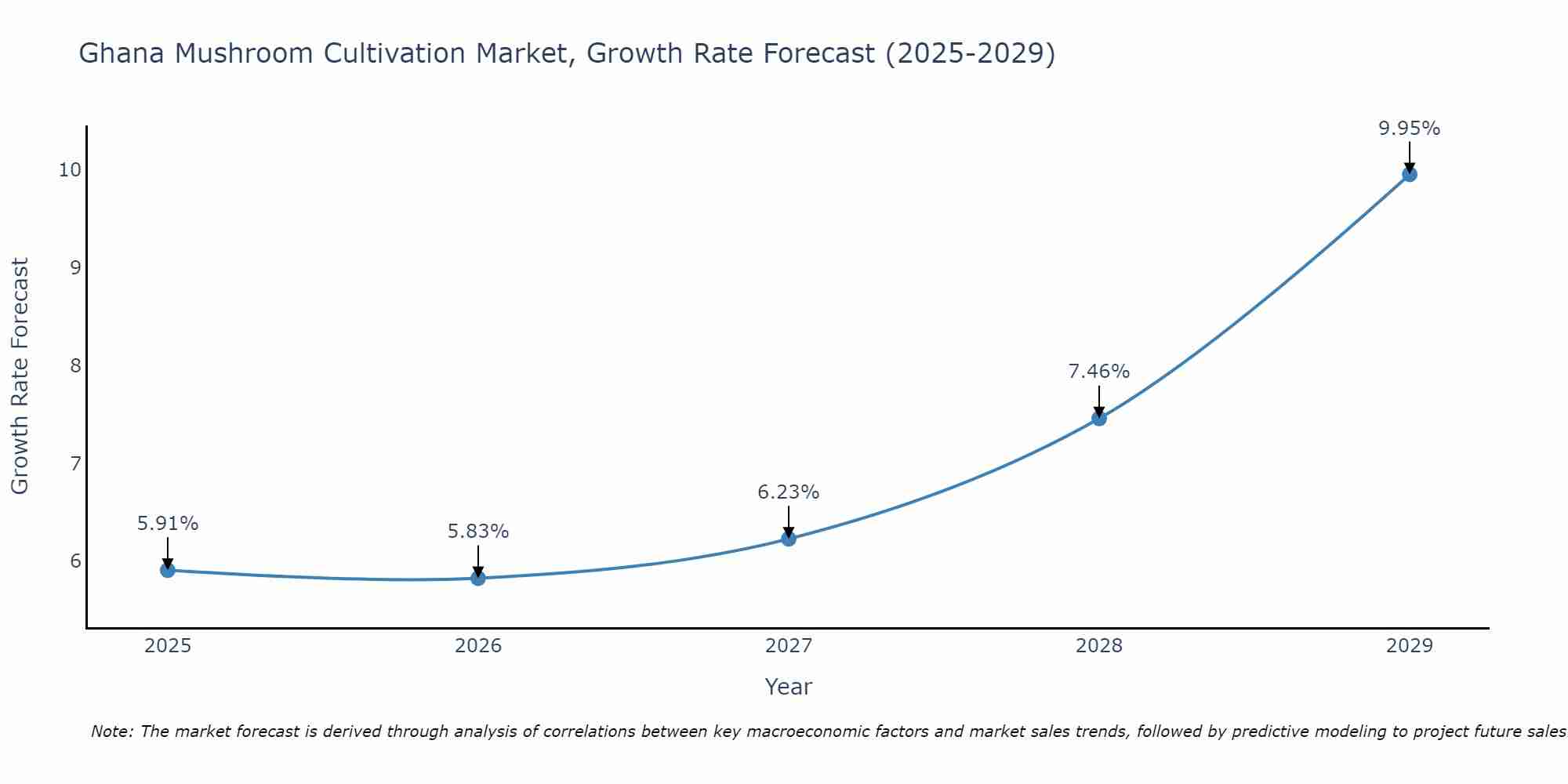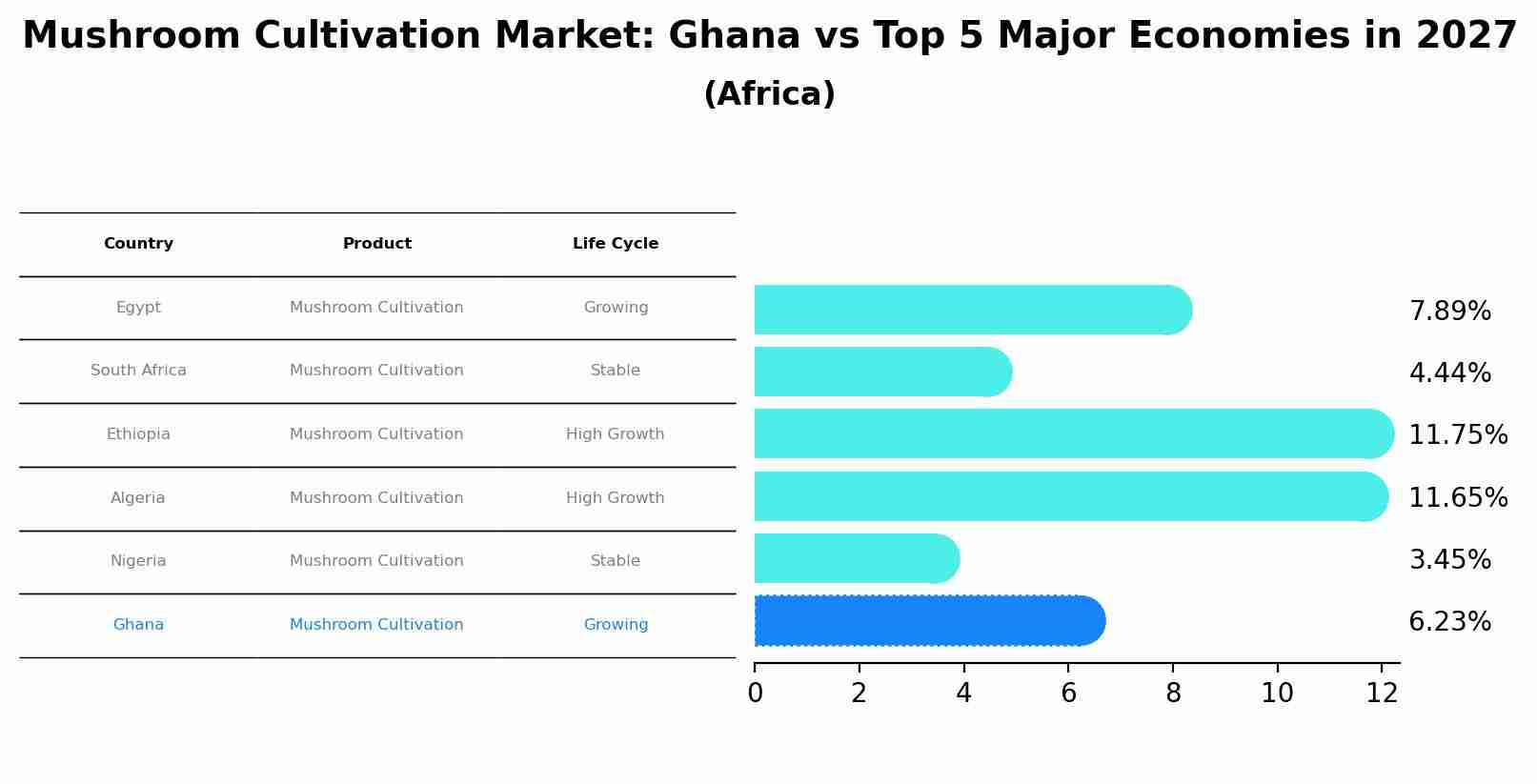Ghana Mushroom Cultivation Market (2025-2031) Outlook | Size, Trends, Value, Revenue, Forecast, Companies, Industry, Share, Growth & Analysis
| Product Code: ETC383156 | Publication Date: Aug 2022 | Updated Date: Apr 2025 | Product Type: Market Research Report | |
| Publisher: 6Wresearch | Author: Shubham Padhi | No. of Pages: 75 | No. of Figures: 35 | No. of Tables: 20 |
Ghana Mushroom Cultivation Market Size Growth Rate
The Ghana Mushroom Cultivation Market is projected to witness mixed growth rate patterns during 2025 to 2029. Commencing at 5.91% in 2025, growth builds up to 9.95% by 2029.

Mushroom Cultivation Market: Ghana vs Top 5 Major Economies in 2027 (Africa)
The Mushroom Cultivation market in Ghana is projected to grow at a growing growth rate of 6.23% by 2027, within the Africa region led by Egypt, along with other countries like South Africa, Ethiopia, Algeria and Nigeria, collectively shaping a dynamic and evolving market environment driven by innovation and increasing adoption of emerging technologies.

Ghana Mushroom Cultivation Market Overview
The mushroom cultivation market in Ghana is expanding as more farmers recognize the economic potential of mushroom farming and its benefits for food security and nutrition.
Drivers of the market
The Ghana mushroom cultivation market is influenced by the increasing awareness of the nutritional, medicinal, and environmental benefits of mushrooms as a sustainable source of protein, vitamins, and antioxidants. Mushroom cultivation involves growing edible fungi in controlled environments using organic substrates such as sawdust, agricultural waste, or composted materials. With Ghana growing population, urbanization, and dietary shifts towards healthy and plant-based foods, there`s a rising demand for fresh and processed mushrooms in local markets, restaurants, and supermarkets. Moreover, the development of innovative cultivation techniques, such as indoor farming, vertical gardening, and mycelium-based materials, drives innovation in mushroom production, enabling year-round harvests, higher yields, and value-added products in Ghana agricultural sector.
Challenges of the market
Limited access to technology and technical expertise pose challenges in the mushroom cultivation market. Additionally, fluctuations in mushroom prices and competition from imported mushrooms impact market dynamics.
Government Policy of the market
In recognition of the nutritional and economic benefits of mushroom cultivation, the government has instituted policies to support the growth of the mushroom cultivation market. These policies prioritize investments in training and extension services, research and development, and market infrastructure to enhance Ghana capabilities in mushroom production, processing, and marketing. By fostering partnerships between mushroom growers, agricultural cooperatives, and regulatory agencies, the government aims to promote sustainable livelihoods, food security, and entrepreneurship opportunities in the mushroom industry.
Key Highlights of the Report:
- Ghana Mushroom Cultivation Market Outlook
- Market Size of Ghana Mushroom Cultivation Market, 2024
- Forecast of Ghana Mushroom Cultivation Market, 2031
- Historical Data and Forecast of Ghana Mushroom Cultivation Revenues & Volume for the Period 2021-2031
- Ghana Mushroom Cultivation Market Trend Evolution
- Ghana Mushroom Cultivation Market Drivers and Challenges
- Ghana Mushroom Cultivation Price Trends
- Ghana Mushroom Cultivation Porter's Five Forces
- Ghana Mushroom Cultivation Industry Life Cycle
- Historical Data and Forecast of Ghana Mushroom Cultivation Market Revenues & Volume By Type for the Period 2021-2031
- Historical Data and Forecast of Ghana Mushroom Cultivation Market Revenues & Volume By Button Mushroom for the Period 2021-2031
- Historical Data and Forecast of Ghana Mushroom Cultivation Market Revenues & Volume By Oyster Mushroom for the Period 2021-2031
- Historical Data and Forecast of Ghana Mushroom Cultivation Market Revenues & Volume By Shiitake Mushroom for the Period 2021-2031
- Historical Data and Forecast of Ghana Mushroom Cultivation Market Revenues & Volume By Others for the Period 2021-2031
- Ghana Mushroom Cultivation Import Export Trade Statistics
- Market Opportunity Assessment By Type
- Ghana Mushroom Cultivation Top Companies Market Share
- Ghana Mushroom Cultivation Competitive Benchmarking By Technical and Operational Parameters
- Ghana Mushroom Cultivation Company Profiles
- Ghana Mushroom Cultivation Key Strategic Recommendations
Frequently Asked Questions About the Market Study (FAQs):
- Single User License$ 1,995
- Department License$ 2,400
- Site License$ 3,120
- Global License$ 3,795
Search
Thought Leadership and Analyst Meet
Our Clients
Related Reports
- Canada Oil and Gas Market (2026-2032) | Share, Segmentation, Value, Industry, Trends, Forecast, Analysis, Size & Revenue, Growth, Competitive Landscape, Outlook, Companies
- Germany Breakfast Food Market (2026-2032) | Industry, Share, Growth, Size, Companies, Value, Analysis, Revenue, Trends, Forecast & Outlook
- Australia Briquette Market (2025-2031) | Growth, Size, Revenue, Forecast, Analysis, Trends, Value, Share, Industry & Companies
- Vietnam System Integrator Market (2025-2031) | Size, Companies, Analysis, Industry, Value, Forecast, Growth, Trends, Revenue & Share
- ASEAN and Thailand Brain Health Supplements Market (2025-2031) | Strategy, Consumer Insights, Analysis, Investment Trends, Opportunities, Growth, Size, Share, Industry, Revenue, Segments, Value, Segmentation, Supply, Forecast, Restraints, Outlook, Competition, Drivers, Trends, Demand, Pricing Analysis, Competitive, Strategic Insights, Companies, Challenges
- ASEAN Bearings Market (2025-2031) | Strategy, Consumer Insights, Analysis, Investment Trends, Opportunities, Growth, Size, Share, Industry, Revenue, Segments, Value, Segmentation, Supply, Forecast, Restraints, Outlook, Competition, Drivers, Trends, Demand, Pricing Analysis, Competitive, Strategic Insights, Companies, Challenges
- Europe Flooring Market (2025-2031) | Outlook, Share, Industry, Trends, Forecast, Companies, Revenue, Size, Analysis, Growth & Value
- Saudi Arabia Manlift Market (2025-2031) | Outlook, Size, Growth, Trends, Companies, Industry, Revenue, Value, Share, Forecast & Analysis
- Uganda Excavator, Crane, and Wheel Loaders Market (2025-2031) | Strategy, Consumer Insights, Analysis, Investment Trends, Opportunities, Growth, Size, Share, Industry, Revenue, Segments, Value, Segmentation, Supply, Forecast, Restraints, Outlook, Competition, Drivers, Trends, Demand, Pricing Analysis, Competitive, Strategic Insights, Companies, Challenges
- Rwanda Excavator, Crane, and Wheel Loaders Market (2025-2031) | Strategy, Consumer Insights, Analysis, Investment Trends, Opportunities, Growth, Size, Share, Industry, Revenue, Segments, Value, Segmentation, Supply, Forecast, Restraints, Outlook, Competition, Drivers, Trends, Demand, Pricing Analysis, Competitive, Strategic Insights, Companies, Challenges
Industry Events and Analyst Meet
Whitepaper
- Middle East & Africa Commercial Security Market Click here to view more.
- Middle East & Africa Fire Safety Systems & Equipment Market Click here to view more.
- GCC Drone Market Click here to view more.
- Middle East Lighting Fixture Market Click here to view more.
- GCC Physical & Perimeter Security Market Click here to view more.
6WResearch In News
- Doha a strategic location for EV manufacturing hub: IPA Qatar
- Demand for luxury TVs surging in the GCC, says Samsung
- Empowering Growth: The Thriving Journey of Bangladesh’s Cable Industry
- Demand for luxury TVs surging in the GCC, says Samsung
- Video call with a traditional healer? Once unthinkable, it’s now common in South Africa
- Intelligent Buildings To Smooth GCC’s Path To Net Zero


















